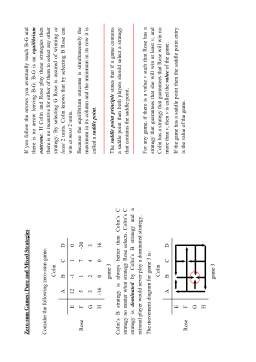Extras din curs
Introduction to the course
• Introduction to Game Theory
− Zero-sum games: pure and mixed strategies
− Non-zero-sum games: Nash equilibrium
− Strategic moves: cooperation and threats
− Arbitration schemes
− N-player games: Shapley value
− Algorithms for solving game matrices
• Improvements to Alpha-Betas
− MTD family of game tree search algorithm
• Human vs. Machines: styles of play
• New techniques in automatic Game-Playing
− Memory-Based/Case-based paradigms
− Automatic learning of Game Strategies
• Games of Strategy
• Adaptive Behaviour
• Distributed Games
• Famous systems, and how they work.
Introduction to Game Theory
Game theory is the analysis (mathematical or otherwise)
of situations which involve conflict and/or cooperation.
A game is characterised by:
1. Two or more players. These players can be any
entity such as a person, a company, a nation, the
natural world and even chance.
2. Each player has a number of strategies (possibly
infinite). A strategy represents a course of actions
the player may choose to follow throughout the
game.
3. The outcome of the game is solely determined by
each players choice of strategies.
4. Each outcome is associated with a set of numerical
payoffs, one for each player. These payoffs
represent the “value” of the outcome of the game to
each player.
An important assumption in game theory is that the
players behave rationally. The goal of each player is to
maximise the payoff the player will receive. The player
has some influence on the outcome of a game since the
player selects their own strategy. But it is the
combination of the strategies selected by each player that
determines the outcome. Sometimes the will be conflict
among the players, such that if player A chooses strategy
X to maximise their payoff then the other players will
lose or gain very little. On other occasions there will be
opportunities for cooperation, where some or all of the
players can work together (by agreement or plausible
threat) to achieve a better payoff than would be possible
if they played individually.
Game theory is not the total solution. Why not?
1. Games in the real world (economic, social,
strategic,...) are very complex and it is unlikely that
you can enumerate all the possible strategies and
accurately evaluate all the possible outcome and
payoffs. However simplified models can realise
simplified versions of the real world game that may
provide an insight into the real world.
2. Game theory presumes rational behaviour by the
players. How many people appear to behave
rationally to you? Do you appear rational to them?
Are your perceptions of the value of the various
payoffs an accurate reflection of their perceived
value of the same payoffs?
3. When you have more than two players or when the
interests of each player are not completely opposed
game theory does not give a unique solution to the
game. What it does offer is a set of suggestions and
partial prescriptions.
Preview document
Conținut arhivă zip
- Intelligent Game Theory.pdf

























